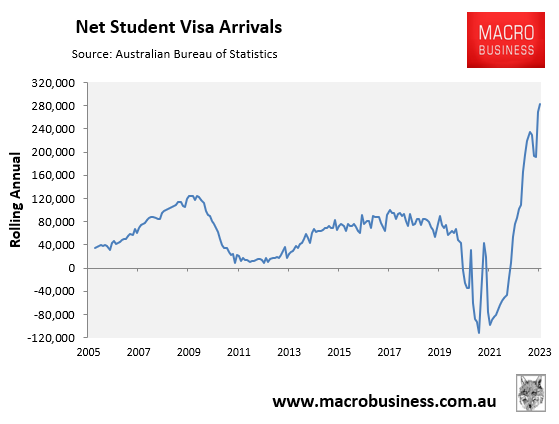On Monday we reported how Australia’s international student boom was being “built on fraud and grift”, with huge volumes of South Asian students arriving only to immediately abandon their courses at established universities to enrol at cheaper private colleges.
The record deluge of arrivals is in response to recent policy changes that increased the number of hours that students could work in Australia while “studying”, alongside increasing the number of years they can remain in Australia to work post graduation.
The Albanese Government has also increased the permanent migrant intake to a record high 195,000, up from 160,000, which has increased the chances of students gaining permanent residency.
The combined policy changes have been ‘red rag to a bull’ for dodgy migration agents and students seeking to use Australia’s student visa system to live and work in Australia.
Net student visa arrivals have soared to record levels, with students from India leading the growth:

On Tuesday, The Age reported that the surge in applications from South Asian students and the associated spike in what the Home Affairs Department identified as fraudulent applications, has driven at least five Australian institutions to implement bans or limitations on students from specific Indian states.
Australia is on course to have the highest annual inflow of Indian students ever, surpassing the previous record of 75,000 set in 2019.
The integrity of Australia’s immigration system and the potential long-term effects on the country’s international education market have raised concerns among government MPs and the education sector in response to the spike.
“The volume of students arriving has come back a lot stronger than anyone was expecting”, said Jonathan Chew from global education firm Navitas.
“We knew there would be a lot of pent-up demand, but there has also been a surge in non-genuine students”.
Punjab and Haryana, two Indian states with a combined population of around 60 million, were completely barred from applying to Edith Cowan University in Perth in February.
In March, Victoria University tightened restrictions on student applications from eight other Indian states, including Uttar Pradesh (population 200 million), Rajasthan (67 million), and Gujarat (60 million).
Three other universities have also tightened restrictions.
The vocational education sector is likewise seeing a surge in applications from students ultimately judged to be too risky to accept.
Education agents, who are largely unregulated by the government, facilitate the majority of international students’ applications to Australian universities.
For each student enrolling that they organise, universities and training organisations pay education agents commissions totalling thousands of dollars.
Education agent Ravi Singh warned too many of Australia’s training colleges have turned into “visa factories” that are more concerned with providing immigration channels than educational opportunities.
With 584,000 people now residing in Australia on student visas and hundreds of thousands more finding employment on graduate visas after completing their studies, it is a gigantic market open to rorting.
Yet, Catriona Jackson, chief executive of Universities Australia, argues education brokers are essential in easing the flow of international students from more than 144 countries to Australia.
Federal Labor MP Julian Hill is one of the few politicians to call the student visa scam out.
Last year, Hill warned that Australia’s international education system has become a “ponzi scheme” for enticing non-genuine students to Australia with unfettered work rights and permanent residency, which was being ruthlessly exploited by unscrupulous education agents.
“Uncapped work rights is being misused by agents in many parts of the world who are flogging our precious student visa as some kind of cheap, low rent work visa. No one should permit that to continue”, Hill said.
“We know that the incentive of a permanent visa to Australia is like a golden ticket from Willy Wonka’s chocolate bar”.
“It’s too powerful an incentive that would drive and pervert behaviour by providers, and some students”, Hill warned.
Hill is now a member of a parliamentary inquiry looking at international education, which will hold its first Melbourne hearing on Tuesday.
In order to eliminate bad advice and deter non-genuine applications, Hill believes the federal government should consider greater regulatory oversight of agents that recruit students, particularly to technical colleges.
The International Education Association of Australia also wants greater regulation of agents. Former Victorian state Liberal MP and CEO Phil Honeywood asserted, “no government, Liberal or Labor, has ever done that”.
The international student “ponzi scheme” will only worsen under Anthony Albanese, who last month announced a new agreement with Australian universities and colleges that would, in his words, mark the beginning of “the most comprehensive and ambitious arrangement agreed to by India with any country”.
Importantly, the accord included the “mutual recognition of qualifications between Australia and India”, which will ease university travel to either nation.
Thus, the Albanese Government has further incentivised Indian student fraudsters to come to Australia.
Instead of actively encouraging as many international students to enter Australia as possible, policymakers should instead target a smaller pool of excellent (genuine) students.
This policy reset could be achieved by increasing the financial hurdles for entering Australia, lifting entry standards (especially English language competency), and removing the clear link between studying, working and permanent residency.
This qualitative approach would:
- lift student quality;
- increase export income per student;
- enhance wages and working conditions;
- reduce enrolment levels to manageable and sustainable levels, thereby enhancing quality and the learning environment for local students; and
- ease population pressures.
Unfortunately, the Albanese Government has instead opted for quantity over quality by trashing entry standards.
Soon stubbornly high youth unemployment, wage theft, exploitation and crush-loaded housing and infrastructure will become a permanent feature of the system.

